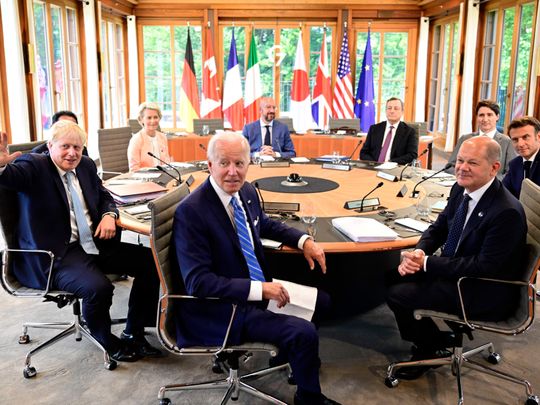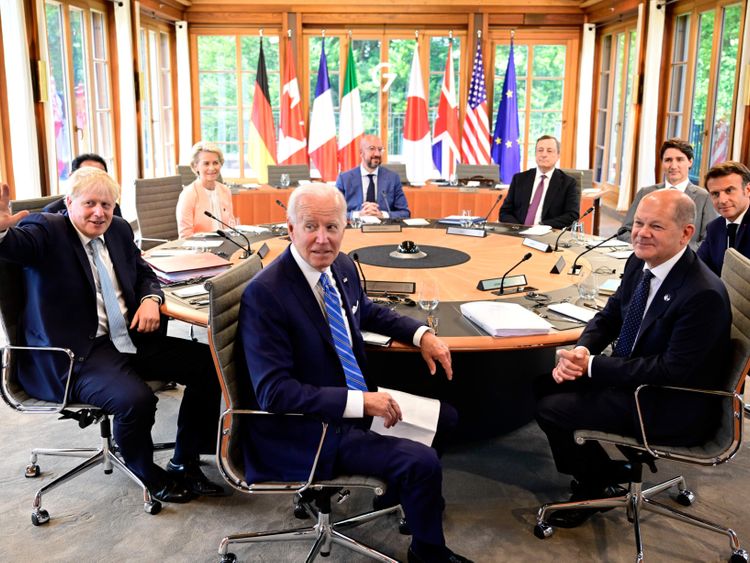
ELMAU, Germany: President Joe Biden on Sunday praised the continued unity of the global alliance confronting Russia, as he and other heads of the Group of Seven leading economies strategized on sustaining the pressure in their effort to isolate Moscow over its months-long attacks on Ukraine.
Biden and his counterparts were meeting to discuss how to secure energy supplies and tackle inflation, aiming to keep fallout from the war from splintering the global coalition working to punish Moscow.
Leaders also were coming together in a new global infrastructure partnership meant to provide an alternative to Russian and Chinese investment in the developing world.
“We’ve got to make sure we have us all staying together,” Biden said during a pre-summit sit-down with German Chancellor Olaf Scholz, who holds the G-7’s rotating presidency and is hosting the gathering. “You know, we’re gonna continue working on economic challenges that we face but I think we get through all this.’’
Scholz replied that the “good message’’ is that “we all made it to stay united, which Putin never expected,’’ a reference to Russian President Vladimir Putin, who sent his military across the border into Ukraine in late February.
“We have to stay together, because Putin has been counting on, from the beginning, that somehow Nato and the G-7 would splinter, but we haven’t and we’re not going to,’’ Biden replied, as he and Scholz sat on a terrace that overlooked the picturesque Bavarian Alps.
“We can’t let this aggression take the form it has and get away with it,” added Biden.
A senior Biden administration official said there was not an extensive discussion of oil price caps in the president’s meeting with Scholtz. The two also did not have a detailed discussion on inflation.
Both leaders agreed, however, there needs to be a negotiated solution to the Ukraine war — but they did not get into specific details on how to achieve it, the official said.
Hours before the summit formally opened, Russia launched missile strikes against the Ukrainian capital, striking at least two residential buildings, Kyiv Mayor Vitali Klitschko said. They were the first such strikes by Russia in three weeks.
Biden condemned Russia’s actions as “more of their barbarism.”
Other leaders echoed Biden’s praise of coalition unity.
The head of the European Union’s council of governments said the 27-member block maintains “unwavering unity’’ in backing Ukraine against Russia’s invasion with money and political support, but that “Ukraine needs more and we are committed to providing more.’’
Ready to supply more military support
European Council President Charles Michel said EU governments were ready to supply “more military support, more financial means, and more political support’’ to enable Ukraine to defend itself and “curb Russia’s ability to wage war.’’
The EU has imposed six rounds of sanctions against Russia, the latest one being a ban on 90% of Russian crude oil imports by the end of the year. The measure is aimed at a pillar of the Kremlin’s finances, its oil and gas revenues.
Biden and the leaders of Britain, Canada, France, Germany, Italy and Japan, plus the EU, were spending Sunday in both formal and informal settings, including working sessions on the war’s effects on the global economy, including inflation, and on infrastructure.
Price caps
Biden, who arrived in Germany early Sunday, said G-7 nations, including the United States, will ban imports of gold from Russia. A formal announcement was expected Tuesday as the leaders hold their annual summit.
Among the issues to be discussed are price caps on energy, which are meant to limit Russian oil and gas profits that Moscow can pump into its war effort. The idea has been championed by U.S. Treasury Secretary Janet Yellen.
Michel said price caps on Russian oil imports were under discussion. But he said “we want to go into the details, we want to fine-tune ... to make sure we have a clear understanding of what are the direct effects’’ if such a step were to be taken by the group.
Leaders were also set to discuss how to maintain commitments addressing climate change while also solving critical energy supply needs brought on by the war.
“There’s no watering down of climate commitments,’’ John Kirby, a spokesman for Biden’s National Security Council, said Saturday as the president flew to Germany.
Biden is also set to formally launch a global infrastructure partnership designed to counter China’s influence in the developing world. He had named it “Build Back Better World’’ and introduced the program at last year’s G-7 summit.
Biden and other leaders will announce the first projects to benefit from what the US sees as an “alternative to infrastructure models that sell debt traps to low- and middle-income partner countries,” Kirby said. The projects are also supposed to help advance US economic competitiveness and our national security,” he said.
After the G-7 summit concludes on Tuesday, Biden will travel to Madrid for a summit of the leaders of the 30 members of Nato to align strategy on the war in Ukraine.









